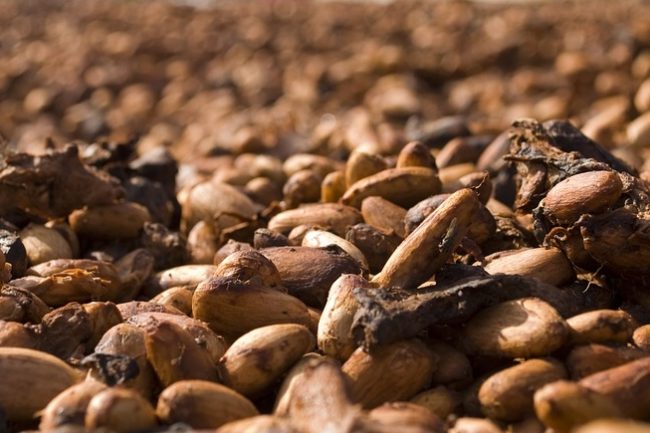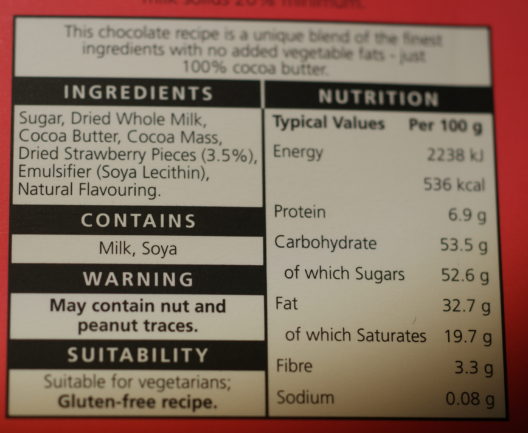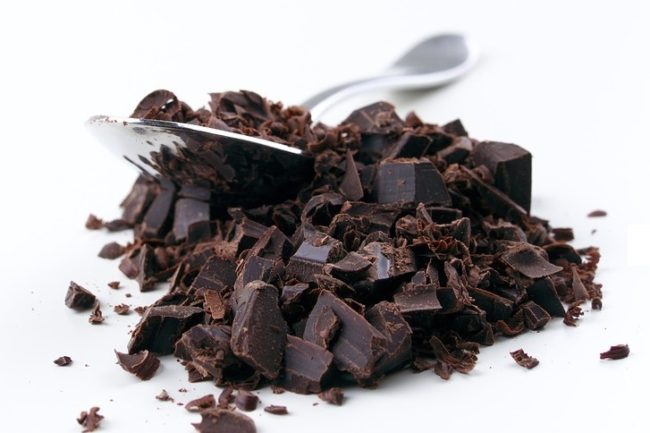Heart Healthy Chocolate What You Need to Know
Summary: Studies show that heart healthy chocolate reduces the risk of cardiovascular death by 45%. Updated with 2017 research published in BMJ, this report also shows you how to make heart healthy chocolate – with fewer calories and without the added sugar and fat. [This article first appeared on the website LongevityFacts. Author: Brady Hartman. ]
Chocolate is good for your heart. Without the calories and fat, heart healthy chocolate is even better. Cocoa contains all of the heart-healthy ingredients of chocolate, with far fewer calories.
Take away the calories and fat, and heart healthy chocolate is even better. Cocoa contains all of the heart-healthy ingredients of chocolate, with far fewer calories.
Cocoa contains all of the heart-healthy ingredients of chocolate, with far fewer calories.
In a massive observational study, Scottish researchers in the U.K. found that that habitual chocolate eaters had a lower risk of heart disease and stroke. Chocolate is rich in antioxidants called flavonoids. Clinical trials have shown that chocolate and cocoa improve blood vessel function and lower blood pressure.

EPIC Observational Study of Heart Healthy Chocolate
In 2015, researchers from the University of Aberdeen (UA) reported that habitual chocolate eaters had a lower risk of heart disease and stroke when compared to those who didn’t eat it. They published their findings in Heart magazine, part of the British Medical Journal. The researchers used the rich data set from the EPIC study, a research project that tracked the eating habits of nearly 21,000 middle-aged and elderly study participants.
Around one in five of the study participants did not eat any chocolate or cocoa. For those who did, daily consumption averaged a quarter ounce, with some eating up to 3 ½ ounces daily. The participants were monitored for an average of almost 12 years, during which time about 14% of them experienced an episode of coronary heart disease or stroke.
At the end of the study, the EPIC researchers found that the chocolate eaters had lower risks of heart disease and death. Compared to those who ate no chocolate, those who ate chocolate each day had an 11% reduced risk of cardiovascular disease – including a 23% decreased the risk of stroke – and 25% lower risk of death.
Co-author of the EPIC study, Professor Phyo Myint, of the School of Medicine & Dentistry, University of Aberdeen remarked that:
“cumulative evidence suggests higher chocolate intake is associated with a lower risk of future cardiovascular events.”

Review of Heart Healthy Chocolate
Not content with their findings, the EPIC authors decided to compare their results with those of other researchers. They performed a second study, this time a systematic review of research linking cocoa, chocolate, and cardiovascular disease. The EPIC researchers gathered all of the available evidence published on the subject and performed a meta-analysis, or a study of studies. In total, they gathered nine published research studies, including data involving nearly 158,000 people.
The researchers pooled the data from the studies linking heart disease and chocolate and came up with startling results. Compared to those who ate little or no chocolate, the heaviest chocolate eaters had a 25% reduced risk of any cardiovascular disease (heart attack and stroke) and a 45% reduced risk of cardiovascular death. The heaviest chocolate eaters ate up to 3 1/2 ounces (100 g/day).
The EPIC researchers included both milk chocolate and dark chocolate consumption in the study. Milk chocolate was the most common form eaten by the study participants. The researchers noted that milk chocolate might also be heart healthy. Study co-author Professor Phyo Myint remarked:
“This may indicate that not only flavonoids but also other compounds, possibly related to milk constituents, such as calcium and fatty acids, may provide an [alternate] explanation for the observed association.”
Bottom Line: Since it pools data from several studies, the meta-analysis is preferred source of evidence. The EPIC researchers showed that chocolate is heart healthy – reducing the risk of coronary heart disease, stroke and cardiovascular death by 29%, 21%, and 45% respectively.
Unfortunately, the EPIC meta-analysis was an observational study, and therefore can’t prove a cause and effect relationship. “Correlation does not imply causation, but it sure is a hint.”
Because clinical trials are much stronger forms of evidence than observational trials, the following sections examine several clinical trials that have directly measured the effects of heart healthy chocolate.

Cocoa Is Heart Healthy Chocolate
Research has shown that chocolate derives its health benefits from cocoa. Cocoa is rich in antioxidant plant compounds called flavonols. Flavonols are a specific type of flavonoids. These powerful antioxidants are also found in fruits, vegetables, tea, wine, and coffee. The flavanols found in cocoa beans have been shown to lower blood pressure, improve vascular health, protect against heart disease.
Another benefit of cocoa is that it is low in calories.
In fact, since the seventeenth century, doctors have used cocoa and chocolate as medicines. Historical documents refer to chocolate being used to treat cardiovascular disorders, including angina and heart pain.

Cocoa’s Heart Healthy Compounds
Cocoa contains about 380 known chemicals. In their natural state, cocoa beans are high in flavonols, but extremely bitter. Roasting and fermentation remove most of the bitterness, but also most of the flavonols. Even so, the finished product is still rich in antioxidants. Cocoa has a higher antioxidant capacity than black tea, green tea, or red wine.
Why is Chocolate Heart Healthy
Several theories exist as to what makes cocoa and chocolate heart healthy. Chocolate has been shown to reduce the risk of atrial fibrillation in one observational studies. Clinical trials have shown that chocolate and cocoa reduce cholesterol, improve vascular health and lower blood pressure.
Chocolate Reduces Atrial Fibrillation
Research suggests that chocolate also reduces atrial fibrillation, a heart condition characterized by a rapid or irregular heartbeat, which can increase the risk of heart failure, stroke, and cognitive decline.
In May 2017, Danish researchers reported that people who consume small amounts of chocolate each week had a 20% lower risk of developing atrial fibrillation (AFib).
The authors of the study estimated that 25 percent of adults would develop AFib during their lifetime.
Bottom Line: This observational study showed that chocolate reduces the risk of atrial fibrillation, but that alone cannot account for the 25% reduced risk of heart attack and stroke observed by the EPIC meta-analysis.
Cocoa Benefits Cholesterol
Here is another benefit of heart healthy chocolate: Cocoa slightly improves cholesterol levels.
In a systematic review published in the March 2012 American Journal for Clinical Nutrition (AJCN), researchers pooled the data from 42 randomized controlled trials (RCTs) with nearly 1300 participants.
After they added up the data, the researchers found that cocoa improves cholesterol, slightly decreasing LDL and slightly increasing HDL. Cocoa lowered LDL by 0.07 mmol/L (2.7mg/dL) and raised HDL by 0.03 mmol/L (1.16mg/dL), on average.
Bottom Line: Cocoa’s cholesterol-fighting abilities are minuscule. So, don’t trade in your cholesterol-lowering statins for cocoa.
Cocoa Improves Vascular Health
Cocoa may also improve endothelial function and lessen the effects of hardening of the arteries.
The authors of the same AJCN study also suggested that cocoa improves endothelial function and may help improve some symptoms of atherosclerosis.
The first stage in atherosclerosis begins with dysfunction in the endothelium or lining of the arteries. A technique called flow-mediated dilatation (FMD) measures endothelial dysfunction using vascular ultrasound.
A bit of caution: the researchers only studied cocoa’s effects on the peripheral arteries, and not where it counts, in the arteries of the heart. The researchers showed that cocoa improved FMD, and while they reported specific improvements, the results weren’t necessarily statistically significant.
Bottom Line: Results suggest that cocoa may help with atherosclerosis, but the AJCN researchers didn’t report reliable evidence.
Cocoa Reduces Blood Pressure
High blood pressure affects more than a quarter of all adults.
For people with high blood pressure, researchers have found that daily cocoa consumption lowers systolic and diastolic BP by 4 and 2 mmHg, respectively.
The evidence comes from a systematic review published in April 2017, by the respected Cochrane group. The researchers analyzed 9 high-quality randomized controlled trials testing cocoa on hypertensive people. The participants consumed an average of about 50 grams of cocoa daily, with an average of 670 milligrams of cocoa flavanols.
Bottom Line: Cocoa lowers blood pressure slightly. Cocoa should never be considered a replacement for blood pressure medication.

Heart Healthy Chocolate Without the Calories
If you want the benefits of heart healthy chocolate, without the calories – you have two options: dark chocolate or pure cocoa powder.
Most commercial chocolate, even dark chocolate is high in calories, due to added sugar and fat. Too much chocolate can contribute to weight gain. On the other hand, cocoa itself, unlike chocolate, is low in sugar and fat while offering health benefits.

Dark Chocolate is Heart Healthy Also
Dark chocolate has more flavonoids and less sugar than milk chocolate but is still loaded with fat. Twenty grams of dark chocolate has about the same amount of cocoa solids as 2 tablespoons (15g) of pure cocoa powder. The difference is that there are 101 calories in 20 grams of dark chocolate and 24 calories in the 2 tablespoons of cocoa powder. Here is the calorie breakdown for dark chocolate: 55% fat, 42% carbs, 3% protein.
Cocoa is Heart Healthy

Cocoa, the key ingredient in chocolate has all the health benefits of chocolate with the extra calories. The downside to cocoa is it has a lower concentration of flavonoids than dark chocolate. Avoid prepackaged chocolate milk mixes, as these are high in added sugar. Purchase pure cocoa powder instead.
If you have tried to dump pure cocoa powder into a glass of milk, you’ve probably noticed that it forms clumps. A pure cocoa powder is harder to mix because it lacks unhealthy sugar and emulsifiers.
Here’s how to avoid the clumping problem:
Make a slurry first. To make a cup of chocolate milk, mix 2 tablespoons of unsweetened cocoa powder and add in only 1 tablespoon of milk. Stir hard until the cocoa forms a slurry. Add 8 ounces of milk, stir again.
Heart Healthy Chocolate Recipes
If you enjoy the chocolate flavor, add the plain cocoa powder to your low-fat milk or morning oatmeal. Below are several recipes using cocoa powder. The first is a typical list of ingredients found in commercially prepared milk chocolate mixes. The second is a delicious and heart healthy chocolate drink that contains half the calories.
Lastly, if you enjoy the chocolate flavor and want even fewer calories, add a plain cocoa powder to oatmeal or coffee. 2 tablespoons of unsweetened cocoa powder weighs about 15 grams, and contains 24 calories: (50% fat, 32% carbs, 18% protein).
Standard Chocolate Milk Ingredients
- 2 tablespoons unsweetened cocoa powder. (24 calories)
- 1 1/2 tablespoons sugar (72 calories)
- 1 cup full-fat milk (103 calories)
- 1/4 teaspoon vanilla extract (optional)
Total 199 Calories
Heart Healthy Chocolate Milk Ingredients
- 2 tablespoons unsweetened cocoa powder. (24 calories)
- Artificial Sweetener 1-3 packets (depending on how sweet you like it)
- 1 cup non-fat milk (83 calories)
- 1/4 teaspoon vanilla extract (optional)
Total 107 Calories
Heart Healthy Chocolate Anything
- Oatmeal, coffee or whatever you like
- 2 tablespoons unsweetened cocoa powder. (24 calories)
Total 24 Calories
Take Home Message
- The EPIC Systematic Review showed that chocolate lowered the risk of coronary heart disease by 25% and cardiovascular deaths by 45%.
- Raw cocoa powder is lower in calories when compared to chocolate.
- Cocoa has many antioxidants called flavonols, shown to be heart healthy.
- Research suggests that cocoa reduces atrial fibrillation, improves cholesterol, benefits vascular health and reduces blood pressure.
- Cocoa is the key ingredient in heart healthy chocolate.
- Dark chocolate is also heart healthy and is higher in flavonols than cocoa powder. Dark chocolate has more fat.
- Dark chocolate and cocoa powder both have their advantages.
- To get the heart health benefits of chocolate without the extra calories, add a pure cocoa powder to foods you normally consume.
Help Us Spread The Word
Please help us spread the word on the benefits of heart healthy chocolate by sharing this article to your social media page. It takes just a simple click on any social media link on this page.
References
Chun Shing Kwok, S Matthijs Boekholdt, Marleen A H Lentjes, Yoon K Loke, Robert N Luben, Jessica K Yeong, Nicholas J Wareham, Phyo K Myint, Kay-Tee Khaw. Habitual chocolate consumption and risk of cardiovascular disease among healthy men and women. Heart 2015; 101:1279-1287. Available online.
Lee Hooper [Lead Author], Colin Kay, Asmaa Abdelhamid, Paul A. Kroon, Jeffrey S Cohn, Eric B. Rimm, and Aedín Cassidy. “Effects of chocolate, cocoa, and flavanols on cardiovascular health: a systematic review and meta-analysis of randomized trials.” Available online.
American Journal Clinical Nutrition. 2012 95: 3 740-751; February 1, 2012. doi:10.3945/ajcn.111.023457.
Isabel Andújar, M. C. Recio, R. M. Giner, and J. L. Ríos, “Cocoa Polyphenols and Their Potential Benefits for Human Health,” Oxidative Medicine and Cellular Longevity, vol. 2012, Article ID 906252, 2012. doi:10.1155/2012/906252. Available online.
Ried K, Fakler P, Stocks NP. Effect of cocoa on blood pressure. Cochrane Database of Systematic Reviews 2017; (4). doi:10.1002/14651858.CD008893.pub3. Available online.
Disclaimer
Diagnosis, Advice, and Treatment: This article is intended for informational and educational purposes only and is not a substitute for professional medical advice. The information provided herein should not be used during any medical emergency or for the diagnosis or treatment of any medical condition. Consult a licensed physician for the diagnosis and treatment of any and all medical conditions. Dial 911 – or an emergency hotline – for all medical emergencies. Refer to a physician before changing your diet, supplement or exercise programs. External Links, Photos & Endorsements: This article is not intended to endorse companies, organizations or products. Links to external websites and depiction or mention of company names or brands are designed for illustration only and do not constitute endorsements.

You need to fix the widgets .. nice report – well written
thanks for posting this